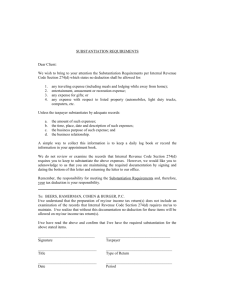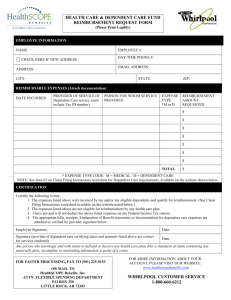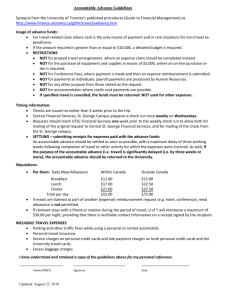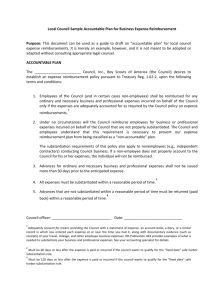MEDICAL EXPENSES/DEDUCTIONS
advertisement
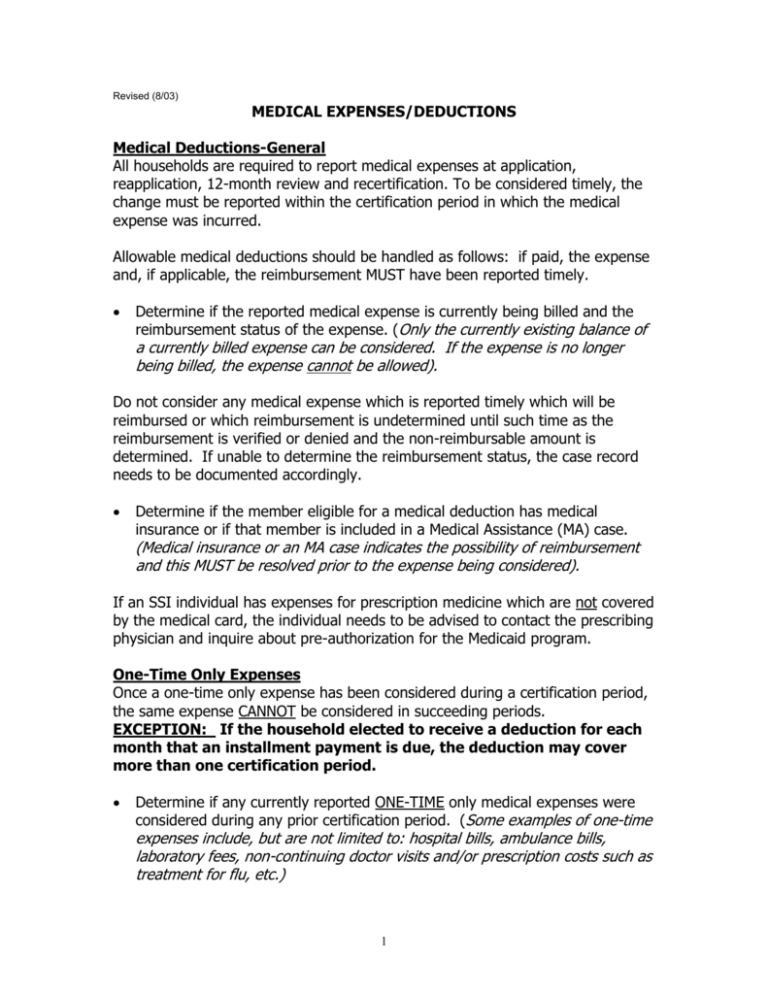
Revised (8/03) MEDICAL EXPENSES/DEDUCTIONS Medical Deductions-General All households are required to report medical expenses at application, reapplication, 12-month review and recertification. To be considered timely, the change must be reported within the certification period in which the medical expense was incurred. Allowable medical deductions should be handled as follows: if paid, the expense and, if applicable, the reimbursement MUST have been reported timely. Determine if the reported medical expense is currently being billed and the reimbursement status of the expense. (Only the currently existing balance of a currently billed expense can be considered. If the expense is no longer being billed, the expense cannot be allowed). Do not consider any medical expense which is reported timely which will be reimbursed or which reimbursement is undetermined until such time as the reimbursement is verified or denied and the non-reimbursable amount is determined. If unable to determine the reimbursement status, the case record needs to be documented accordingly. Determine if the member eligible for a medical deduction has medical insurance or if that member is included in a Medical Assistance (MA) case. (Medical insurance or an MA case indicates the possibility of reimbursement and this MUST be resolved prior to the expense being considered). If an SSI individual has expenses for prescription medicine which are not covered by the medical card, the individual needs to be advised to contact the prescribing physician and inquire about pre-authorization for the Medicaid program. One-Time Only Expenses Once a one-time only expense has been considered during a certification period, the same expense CANNOT be considered in succeeding periods. EXCEPTION: If the household elected to receive a deduction for each month that an installment payment is due, the deduction may cover more than one certification period. Determine if any currently reported ONE-TIME only medical expenses were considered during any prior certification period. (Some examples of one-time expenses include, but are not limited to: hospital bills, ambulance bills, laboratory fees, non-continuing doctor visits and/or prescription costs such as treatment for flu, etc.) 1 For one-time only, non-reimbursable expenses, the household has the option of receiving the entire deduction at one time, having it averaged over the certification period, or receiving a deduction for each month an installment payment is due. The method that the household chooses must be documented. For one-time only, non-reimbursable expenses that are reported during the last month of the certification period, the household has the option of: (1) electing to have the entire deduction considered in the first month of the succeeding certification period or (2) having the deduction averaged over the succeeding certification period and receiving a deduction for each month an installment payment is due. The method the household chooses must be documented. A SNAP household that is receiving a medical deduction for a one-time only expense continues to receive a deduction even if the eligible member dies. Households certified for more than 12 months that incur one-time medical expenses in the first 12 months of the certification may elect to do the folloiwng: Have the expense averaged over the remainder of the first 12 months of the certification period. Budget the expense in one month. Average the expense over the remainder of the certification period. Recurring Medical Expenses For recurring medical expenses, such as a regular bill for prescriptions or attendant care, the non-reimbursable expense is considered ONLY in the month the expense is billed. Recurring medical expenses that are past due or brought forward from prior billing periods are NOT allowed. Fluctuating Medical Expenses For fluctuating medical expenses, such as a prescription that fluctuates in cost or frequency of use, verification of all non-reimbursable expenses for the last 2 months, which are expected to continue, needs to be obtained. The average monthly amount is considered. Fluctuating expenses DO NOT include one-time bills that are NOT expected to continue. (If the last 2 months of fluctuating medical expenses do not adequately represent the client’s anticipated expenses for the certification period, less than 2 months of fluctuating expenses can be considered.) 2 Other For medical expenses paid by a credit card, allow only the expense and NOT the interest. Consider the expense to have occurred when the bill is received. Payments that are made on a loan when the loan is used to pay a one-time medical expense ARE allowed. Do NOT allow the interest as part of the expense. For allowable medical insurance charges, only the amount billed for the actual premium is considered. Any surcharge or billing/handling fee in excess of the premium cannot be considered as part of the deduction. (Example: A household is billed annually for their medical insurance premiums but the household chooses to make monthly payments. The company charges an additional fee for the monthly billing statements. Only the annual amount billed, divided by twelve, can be considered as the monthly amount for deduction purposes). Medical expenses MUST be reported at application, reapplication and recertification according to reporting requirements. If the expense is not reported timely, NO deduction is allowed. Allowable Medical Deductions The following are ALLOWABLE medical expenses: Medical and dental care including psychotherapy and rehabilitation services provided by a licensed practitioner and authorized by State law or other qualified health professional. Hospitalization or out-patient treatment, nursing care and nursing home care including payments by the household for an individual who was a household member prior to entering a hospital or nursing home. Prescription drugs prescribed by a licensed practitioner and other over-thecounter medication, including insulin, approved by a licensed practitioner or other qualified health professional along with the 25 cents revenue tax that pharmacies are allowed to charge per prescription. Medical supplies, sick-room equipment including rental or other prescribed equipment and the cost of repairs necessary to keep the equipment in working condition. Health and hospitalization insurance policy premiums (without surcharges), for the eligible person only. (Medicare premiums paid by the eligible household related to coverage under Title XVIII of the Social Security Act, SMI premiums paid by the Medicaid Program, including those for QMB, QDWI, or SLMB eligible individuals, are not an allowable deduction). Any cost-sharing or spend down expenses incurred by Medicaid recipients. Dentures, hearing aids and prosthetics. Eye glasses and contact lenses prescribed by a physician skilled in eye disease or by an optometrist. 3 The cost of securing and maintaining “service animals,” such as seeing-eye dogs, hearing guide dogs, and housekeeper monkeys trained to assist quadriplegics, including the cost of food and veterinary bills. Telephone charges for telephone aids, such as amplifiers and warning signals for disabled persons and costs of teletypewriter equipment for the deaf. Reasonable cost of transportation and lodging to obtain medical treatment for services. This includes trips to a doctor, dentist, etc. as well as trips to fill prescriptions for medicine, dentures, hearing aid, eyeglasses, sickroom equipment, etc. Reasonable transportation cost is the current state mileage rate when a personal vehicle is used or the actual verified costs. Lodging costs are the ACTUAL verified costs. Maintaining an attendant, homemaker, home health aide, child-care services or housekeeper necessary due to age, infirmity or illness. State and federal withholding taxes paid by the disabled individual for attendant care payment, even if paid with other monies received by the disabled individual, are allowable. Disallowable Medical Deductions The following medical expenses are disallowed: The cost of health and accident policies such as those payable in lump sum settlements for death or dismemberment or income maintenance policies such as those that continue mortgage or loan payments while the beneficiary is disabled. Any surcharge or billing fee added to the monthly insurance premium. Expenses of spouses or other persons receiving benefits as a dependent of the SSI or disability recipient. Expenses for which the household will be reimbursed or which for which an insurance company or government program will directly pay. The nonreimbursable portion is considered at the time the amount of reimbursement is verified or when it is denied. If the reimbursement status cannot be determined, the expense is NOT considered and the case record should be documented accordingly. Expenses incurred jointly with other household members are not allowed in their entirety. Only the eligible person’s expense is deducted. If the eligible person’s share cannot be identified, the expense is prorated evenly among the members the expense covers. Medical expenses billed to a SNAP household but which are for a nonhousehold member. Manual References Vol., II, Sections 5420, 5430, 5440 4
